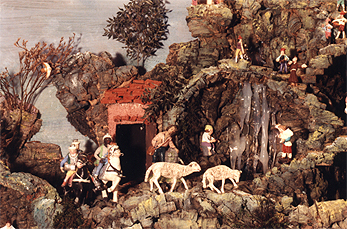|
Year 2 - n.2 - May 2002
|

|
|
|
|
The
Symbolism of Water (the first part)
|
|
One
of the most suggestive aspects of the crib is the water
represented by a river or by a stream, whether it is made by
silver foil, by flocks of cottonwool, or by making flow real
water with some ingenious devices. The poetry of the river
is so suggestive nobody would build a crib without its
stream. It is also important to say that in the popular crib the
realistic element is always joined to the archetypic power of the
symbol. For this reason it is interesting to stop our attention, for a little
time, on the symbolism of water that, in our daily life, involves some of our easier acts. For example,
when we say that we "drink a toast to a promotion",
we use a sentence that has got, in
an informal way, the same symbolic content of the blessing
ritual with which the priest purifies people of their sins or
blesses the objects to save them from the
profane purpose and keeps them for the divine service.
|
|

|
|
The symbolic meaning is immediately
comprehensible in these acts because of the move of the material events on the spiritual
level
by a mental process that is analogy; since water is the means that removes the material spots that
deface beauty and exterior decorum, the blessed water has
got the same effect on the spiritual level.
But
it is not sufficient to say that the symbols are one of the most
interesting and complex expressions of the spirit that, using
them, shows itselfs in the dreams, in the religion and in the
art. Moreover, it is important to remember that the
simbols language is marked by a fundamental ambiguity. For this
reason they, in the language of the conversational reason, can have a
posite valence and a negative valence, but never an only (univocal)
meaning: a symbol is always a set of significations that are
often in contrast among them. Now, since water is a very important
element for man, it is one of the most complex and reachest symbols.
|
|
Italo Sarcone
|
|
|



